


2020 Espace V (Phase I)
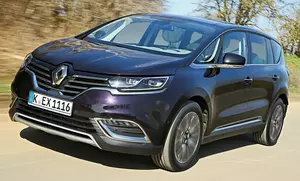
2015 Espace V
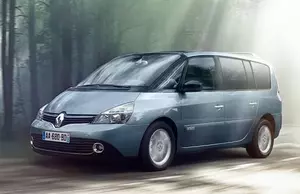
2012 Espace IV (Phase IV)
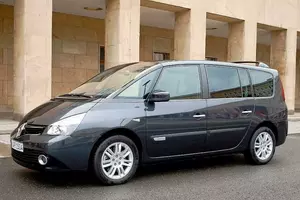
2012 Grand Espace IV (Phase IV)

2010 Espace IV (Phase III)

2010 Grand Espace IV (Phase III)
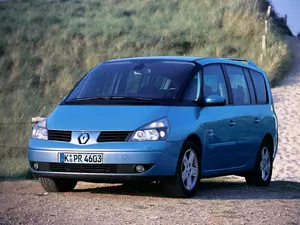
2006 Espace IV (Phase II)
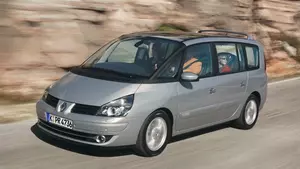
2006 Grand Espace IV (Phase II)

2002 Espace IV
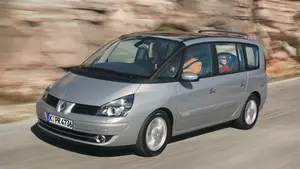
2002 Grand Espace IV
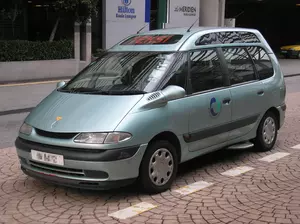
2000 Espace III (JE, Phase II)
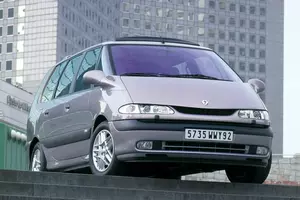
2000 Grand Espace III (JE, Phase II)
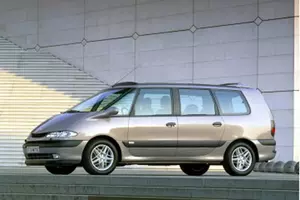
1998 Grand Espace III (JE)
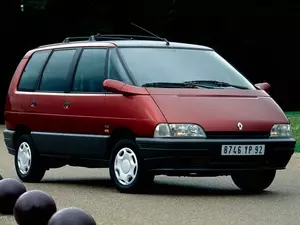
1996 Espace III (JE)
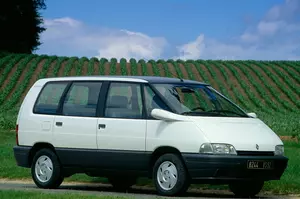
1991 Espace II (J63)

1988 Espace I (J11/13, Phase II 1988)

1984 Espace I (J11/13)

| Vehicle | Curb weight | Difference from world's smallest | Weight to power ratio | 0—60 mph acceleration ratio | Consumption ratio |
|---|---|---|---|---|---|
| 1.8 TCe |
1679 kg / 3702 lbs |
1254 kg (2765 lbs) heavier | 7 kg to 1 hp | 224 kg/s (494 lbs/s) |
221 kg/L (487 lbs/L) |
| 2.0 Blue dCi |
1770 kg / 3903 lbs |
1345 kg (2966 lbs) heavier | 9 kg to 1 hp | 206 kg/s (454 lbs/s) |
334 kg/L (736 lbs/L) |
| Vehicle | 1.8 TCe |
|---|---|
| Curb weight |
1679 kg / 3702 lbs |
| Difference from world's smallest | 1254 kg (1254 lbs) heavier |
| Weight to power ratio | 7 kg to 1 hp |
| 0—60 mph acceleration ratio | 224 kg/s (494 lbs/s) |
| Consumption ratio |
221 kg/L (487 lbs/L) |
| Vehicle | 2.0 Blue dCi |
| Curb weight |
1770 kg / 3903 lbs |
| Difference from world's smallest | 1345 kg (1345 lbs) heavier |
| Weight to power ratio | 9 kg to 1 hp |
| 0—60 mph acceleration ratio | 206 kg/s (454 lbs/s) |
| Consumption ratio |
334 kg/L (736 lbs/L) |

| Vehicle | Curb weight | Difference from world's smallest | Weight to power ratio | 0—60 mph acceleration ratio | Consumption ratio |
|---|---|---|---|---|---|
| 1.6 dCi |
1659 kg / 3658 lbs |
1234 kg (2721 lbs) heavier | 10 kg to 1 hp | 176 kg/s (388 lbs/s) |
361 kg/L (796 lbs/L) |
| 1.6 TCe |
1609 kg / 3548 lbs |
1184 kg (2611 lbs) heavier | 8 kg to 1 hp | 196 kg/s (432 lbs/s) |
260 kg/L (573 lbs/L) |
| 1.8 Energy TCe |
1610 kg / 3550 lbs |
1185 kg (2613 lbs) heavier | 7 kg to 1 hp | 224 kg/s (494 lbs/s) |
237 kg/L (523 lbs/L) |
| 2.0 Blue dCi |
1765 kg / 3892 lbs |
1340 kg (2955 lbs) heavier | 9 kg to 1 hp | 205 kg/s (452 lbs/s) |
333 kg/L (734 lbs/L) |
| 1.8 TCe |
1672 kg / 3687 lbs |
1247 kg (2750 lbs) heavier | 7 kg to 1 hp | 223 kg/s (492 lbs/s) |
226 kg/L (498 lbs/L) |
| Vehicle | 1.6 dCi |
|---|---|
| Curb weight |
1659 kg / 3658 lbs |
| Difference from world's smallest | 1234 kg (1234 lbs) heavier |
| Weight to power ratio | 10 kg to 1 hp |
| 0—60 mph acceleration ratio | 176 kg/s (388 lbs/s) |
| Consumption ratio |
361 kg/L (796 lbs/L) |
| Vehicle | 1.6 TCe |
| Curb weight |
1609 kg / 3548 lbs |
| Difference from world's smallest | 1184 kg (1184 lbs) heavier |
| Weight to power ratio | 8 kg to 1 hp |
| 0—60 mph acceleration ratio | 196 kg/s (432 lbs/s) |
| Consumption ratio |
260 kg/L (573 lbs/L) |
| Vehicle | 1.8 Energy TCe |
| Curb weight |
1610 kg / 3550 lbs |
| Difference from world's smallest | 1185 kg (1185 lbs) heavier |
| Weight to power ratio | 7 kg to 1 hp |
| 0—60 mph acceleration ratio | 224 kg/s (494 lbs/s) |
| Consumption ratio |
237 kg/L (523 lbs/L) |
| Vehicle | 2.0 Blue dCi |
| Curb weight |
1765 kg / 3892 lbs |
| Difference from world's smallest | 1340 kg (1340 lbs) heavier |
| Weight to power ratio | 9 kg to 1 hp |
| 0—60 mph acceleration ratio | 205 kg/s (452 lbs/s) |
| Consumption ratio |
333 kg/L (734 lbs/L) |
| Vehicle | 1.8 TCe |
| Curb weight |
1672 kg / 3687 lbs |
| Difference from world's smallest | 1247 kg (1247 lbs) heavier |
| Weight to power ratio | 7 kg to 1 hp |
| 0—60 mph acceleration ratio | 223 kg/s (492 lbs/s) |
| Consumption ratio |
226 kg/L (498 lbs/L) |

| Vehicle | Curb weight | Difference from world's smallest | Weight to power ratio | 0—60 mph acceleration ratio | Consumption ratio |
|---|---|---|---|---|---|
| 2.0 dCi |
1933 kg / 4262 lbs |
1508 kg (3325 lbs) heavier | 11 kg to 1 hp | 184 kg/s (406 lbs/s) |
302 kg/L (666 lbs/L) |
| 2.0 TCe |
1732 kg / 3819 lbs |
1307 kg (2882 lbs) heavier | 10 kg to 1 hp | 188 kg/s (415 lbs/s) |
204 kg/L (450 lbs/L) |
| Vehicle | 2.0 dCi |
|---|---|
| Curb weight |
1933 kg / 4262 lbs |
| Difference from world's smallest | 1508 kg (1508 lbs) heavier |
| Weight to power ratio | 11 kg to 1 hp |
| 0—60 mph acceleration ratio | 184 kg/s (406 lbs/s) |
| Consumption ratio |
302 kg/L (666 lbs/L) |
| Vehicle | 2.0 TCe |
| Curb weight |
1732 kg / 3819 lbs |
| Difference from world's smallest | 1307 kg (1307 lbs) heavier |
| Weight to power ratio | 10 kg to 1 hp |
| 0—60 mph acceleration ratio | 188 kg/s (415 lbs/s) |
| Consumption ratio |
204 kg/L (450 lbs/L) |

| Vehicle | Curb weight | Difference from world's smallest | Weight to power ratio | 0—60 mph acceleration ratio | Consumption ratio |
|---|---|---|---|---|---|
| 2.0 dCi |
1931 kg / 4258 lbs |
1506 kg (3321 lbs) heavier | 15 kg to 1 hp | 169 kg/s (373 lbs/s) |
339 kg/L (747 lbs/L) |
| 2.0 TCe |
1762 kg / 3885 lbs |
1337 kg (2948 lbs) heavier | 10 kg to 1 hp | 192 kg/s (423 lbs/s) |
207 kg/L (456 lbs/L) |
| Vehicle | 2.0 dCi |
|---|---|
| Curb weight |
1931 kg / 4258 lbs |
| Difference from world's smallest | 1506 kg (1506 lbs) heavier |
| Weight to power ratio | 15 kg to 1 hp |
| 0—60 mph acceleration ratio | 169 kg/s (373 lbs/s) |
| Consumption ratio |
339 kg/L (747 lbs/L) |
| Vehicle | 2.0 TCe |
| Curb weight |
1762 kg / 3885 lbs |
| Difference from world's smallest | 1337 kg (1337 lbs) heavier |
| Weight to power ratio | 10 kg to 1 hp |
| 0—60 mph acceleration ratio | 192 kg/s (423 lbs/s) |
| Consumption ratio |
207 kg/L (456 lbs/L) |

| Vehicle | Curb weight | Difference from world's smallest | Weight to power ratio | 0—60 mph acceleration ratio | Consumption ratio |
|---|---|---|---|---|---|
| 2.0 TCe |
1760 kg / 3881 lbs |
1335 kg (2944 lbs) heavier | 10 kg to 1 hp | 191 kg/s (421 lbs/s) |
200 kg/L (441 lbs/L) |
| 2.0 dCi |
1901 kg / 4192 lbs |
1476 kg (3255 lbs) heavier | 15 kg to 1 hp | 167 kg/s (368 lbs/s) |
292 kg/L (644 lbs/L) |
| Vehicle | 2.0 TCe |
|---|---|
| Curb weight |
1760 kg / 3881 lbs |
| Difference from world's smallest | 1335 kg (1335 lbs) heavier |
| Weight to power ratio | 10 kg to 1 hp |
| 0—60 mph acceleration ratio | 191 kg/s (421 lbs/s) |
| Consumption ratio |
200 kg/L (441 lbs/L) |
| Vehicle | 2.0 dCi |
| Curb weight |
1901 kg / 4192 lbs |
| Difference from world's smallest | 1476 kg (1476 lbs) heavier |
| Weight to power ratio | 15 kg to 1 hp |
| 0—60 mph acceleration ratio | 167 kg/s (368 lbs/s) |
| Consumption ratio |
292 kg/L (644 lbs/L) |

| Vehicle | Curb weight | Difference from world's smallest | Weight to power ratio | 0—60 mph acceleration ratio | Consumption ratio |
|---|---|---|---|---|---|
| 2.0 dCi |
1931 kg / 4258 lbs |
1506 kg (3321 lbs) heavier | 15 kg to 1 hp | 169 kg/s (373 lbs/s) |
297 kg/L (655 lbs/L) |
| 2.0 TCe |
1815 kg / 4002 lbs |
1390 kg (3065 lbs) heavier | 11 kg to 1 hp | 197 kg/s (434 lbs/s) |
206 kg/L (454 lbs/L) |
| Vehicle | 2.0 dCi |
|---|---|
| Curb weight |
1931 kg / 4258 lbs |
| Difference from world's smallest | 1506 kg (1506 lbs) heavier |
| Weight to power ratio | 15 kg to 1 hp |
| 0—60 mph acceleration ratio | 169 kg/s (373 lbs/s) |
| Consumption ratio |
297 kg/L (655 lbs/L) |
| Vehicle | 2.0 TCe |
| Curb weight |
1815 kg / 4002 lbs |
| Difference from world's smallest | 1390 kg (1390 lbs) heavier |
| Weight to power ratio | 11 kg to 1 hp |
| 0—60 mph acceleration ratio | 197 kg/s (434 lbs/s) |
| Consumption ratio |
206 kg/L (454 lbs/L) |

| Vehicle | Curb weight | Difference from world's smallest | Weight to power ratio | 0—60 mph acceleration ratio | Consumption ratio |
|---|---|---|---|---|---|
| 1.9 dCi |
1815 kg / 4002 lbs |
1390 kg (3065 lbs) heavier | 15 kg to 1 hp | 145 kg/s (320 lbs/s) |
267 kg/L (589 lbs/L) |
| 2.0 Turbo 16V |
1825 kg / 4024 lbs |
1400 kg (3087 lbs) heavier | 11 kg to 1 hp | 181 kg/s (399 lbs/s) |
184 kg/L (406 lbs/L) |
| 2.0 16V |
1785 kg / 3936 lbs |
1360 kg (2999 lbs) heavier | 13 kg to 1 hp | 150 kg/s (331 lbs/s) |
186 kg/L (410 lbs/L) |
| 2.0 dCi |
1855 kg / 4090 lbs |
1430 kg (3153 lbs) heavier | 12 kg to 1 hp | 184 kg/s (406 lbs/s) |
261 kg/L (576 lbs/L) |
| 2.2 dCi |
1970 kg / 4344 lbs |
1545 kg (3407 lbs) heavier | 14 kg to 1 hp | 149 kg/s (329 lbs/s) |
214 kg/L (472 lbs/L) |
| 3.5 V6 |
1845 kg / 4068 lbs |
1420 kg (3131 lbs) heavier | 8 kg to 1 hp | 240 kg/s (529 lbs/s) |
154 kg/L (340 lbs/L) |
| 3.0 dCi V6 |
1925 kg / 4245 lbs |
1500 kg (3308 lbs) heavier | 11 kg to 1 hp | 185 kg/s (408 lbs/s) |
205 kg/L (452 lbs/L) |
| Vehicle | 1.9 dCi |
|---|---|
| Curb weight |
1815 kg / 4002 lbs |
| Difference from world's smallest | 1390 kg (1390 lbs) heavier |
| Weight to power ratio | 15 kg to 1 hp |
| 0—60 mph acceleration ratio | 145 kg/s (320 lbs/s) |
| Consumption ratio |
267 kg/L (589 lbs/L) |
| Vehicle | 2.0 Turbo 16V |
| Curb weight |
1825 kg / 4024 lbs |
| Difference from world's smallest | 1400 kg (1400 lbs) heavier |
| Weight to power ratio | 11 kg to 1 hp |
| 0—60 mph acceleration ratio | 181 kg/s (399 lbs/s) |
| Consumption ratio |
184 kg/L (406 lbs/L) |
| Vehicle | 2.0 16V |
| Curb weight |
1785 kg / 3936 lbs |
| Difference from world's smallest | 1360 kg (1360 lbs) heavier |
| Weight to power ratio | 13 kg to 1 hp |
| 0—60 mph acceleration ratio | 150 kg/s (331 lbs/s) |
| Consumption ratio |
186 kg/L (410 lbs/L) |
| Vehicle | 2.0 dCi |
| Curb weight |
1855 kg / 4090 lbs |
| Difference from world's smallest | 1430 kg (1430 lbs) heavier |
| Weight to power ratio | 12 kg to 1 hp |
| 0—60 mph acceleration ratio | 184 kg/s (406 lbs/s) |
| Consumption ratio |
261 kg/L (576 lbs/L) |
| Vehicle | 2.2 dCi |
| Curb weight |
1970 kg / 4344 lbs |
| Difference from world's smallest | 1545 kg (1545 lbs) heavier |
| Weight to power ratio | 14 kg to 1 hp |
| 0—60 mph acceleration ratio | 149 kg/s (329 lbs/s) |
| Consumption ratio |
214 kg/L (472 lbs/L) |
| Vehicle | 3.5 V6 |
| Curb weight |
1845 kg / 4068 lbs |
| Difference from world's smallest | 1420 kg (1420 lbs) heavier |
| Weight to power ratio | 8 kg to 1 hp |
| 0—60 mph acceleration ratio | 240 kg/s (529 lbs/s) |
| Consumption ratio |
154 kg/L (340 lbs/L) |
| Vehicle | 3.0 dCi V6 |
| Curb weight |
1925 kg / 4245 lbs |
| Difference from world's smallest | 1500 kg (1500 lbs) heavier |
| Weight to power ratio | 11 kg to 1 hp |
| 0—60 mph acceleration ratio | 185 kg/s (408 lbs/s) |
| Consumption ratio |
205 kg/L (452 lbs/L) |

| Vehicle | Curb weight | Difference from world's smallest | Weight to power ratio | 0—60 mph acceleration ratio | Consumption ratio |
|---|---|---|---|---|---|
| 1.9 dCi |
1870 kg / 4123 lbs |
1445 kg (3186 lbs) heavier | 16 kg to 1 hp | 150 kg/s (331 lbs/s) |
271 kg/L (598 lbs/L) |
| 2.0 TCe |
1840 kg / 4057 lbs |
1415 kg (3120 lbs) heavier | 11 kg to 1 hp | 182 kg/s (401 lbs/s) |
186 kg/L (410 lbs/L) |
| 2.0 dCi |
1927 kg / 4249 lbs |
1502 kg (3312 lbs) heavier | 15 kg to 1 hp | 151 kg/s (333 lbs/s) |
260 kg/L (573 lbs/L) |
| 3.5 V6 |
1890 kg / 4167 lbs |
1465 kg (3230 lbs) heavier | 8 kg to 1 hp | 245 kg/s (540 lbs/s) |
155 kg/L (342 lbs/L) |
| 2.2 dCi |
1980 kg / 4366 lbs |
1555 kg (3429 lbs) heavier | 14 kg to 1 hp | 150 kg/s (331 lbs/s) |
215 kg/L (474 lbs/L) |
| 3.0 dCi V6 |
1965 kg / 4333 lbs |
1540 kg (3396 lbs) heavier | 11 kg to 1 hp | 189 kg/s (417 lbs/s) |
209 kg/L (461 lbs/L) |
| Vehicle | 1.9 dCi |
|---|---|
| Curb weight |
1870 kg / 4123 lbs |
| Difference from world's smallest | 1445 kg (1445 lbs) heavier |
| Weight to power ratio | 16 kg to 1 hp |
| 0—60 mph acceleration ratio | 150 kg/s (331 lbs/s) |
| Consumption ratio |
271 kg/L (598 lbs/L) |
| Vehicle | 2.0 TCe |
| Curb weight |
1840 kg / 4057 lbs |
| Difference from world's smallest | 1415 kg (1415 lbs) heavier |
| Weight to power ratio | 11 kg to 1 hp |
| 0—60 mph acceleration ratio | 182 kg/s (401 lbs/s) |
| Consumption ratio |
186 kg/L (410 lbs/L) |
| Vehicle | 2.0 dCi |
| Curb weight |
1927 kg / 4249 lbs |
| Difference from world's smallest | 1502 kg (1502 lbs) heavier |
| Weight to power ratio | 15 kg to 1 hp |
| 0—60 mph acceleration ratio | 151 kg/s (333 lbs/s) |
| Consumption ratio |
260 kg/L (573 lbs/L) |
| Vehicle | 3.5 V6 |
| Curb weight |
1890 kg / 4167 lbs |
| Difference from world's smallest | 1465 kg (1465 lbs) heavier |
| Weight to power ratio | 8 kg to 1 hp |
| 0—60 mph acceleration ratio | 245 kg/s (540 lbs/s) |
| Consumption ratio |
155 kg/L (342 lbs/L) |
| Vehicle | 2.2 dCi |
| Curb weight |
1980 kg / 4366 lbs |
| Difference from world's smallest | 1555 kg (1555 lbs) heavier |
| Weight to power ratio | 14 kg to 1 hp |
| 0—60 mph acceleration ratio | 150 kg/s (331 lbs/s) |
| Consumption ratio |
215 kg/L (474 lbs/L) |
| Vehicle | 3.0 dCi V6 |
| Curb weight |
1965 kg / 4333 lbs |
| Difference from world's smallest | 1540 kg (1540 lbs) heavier |
| Weight to power ratio | 11 kg to 1 hp |
| 0—60 mph acceleration ratio | 189 kg/s (417 lbs/s) |
| Consumption ratio |
209 kg/L (461 lbs/L) |

| Vehicle | Curb weight | Difference from world's smallest | Weight to power ratio | 0—60 mph acceleration ratio | Consumption ratio |
|---|---|---|---|---|---|
| 2.0i Turbo 16V |
1780 kg / 3925 lbs |
1355 kg (2988 lbs) heavier | 11 kg to 1 hp | 173 kg/s (381 lbs/s) |
166 kg/L (366 lbs/L) |
| 2.2 dCi |
1850 kg / 4079 lbs |
1425 kg (3142 lbs) heavier | 12 kg to 1 hp | 170 kg/s (375 lbs/s) |
240 kg/L (529 lbs/L) |
| 1.9 dCi |
1770 kg / 3903 lbs |
1345 kg (2966 lbs) heavier | 15 kg to 1 hp | 142 kg/s (313 lbs/s) |
260 kg/L (573 lbs/L) |
| 2.0i 16V |
1665 kg / 3671 lbs |
1240 kg (2734 lbs) heavier | 12 kg to 1 hp | 140 kg/s (309 lbs/s) |
177 kg/L (390 lbs/L) |
| 3.0 dCi |
1920 kg / 4234 lbs |
1495 kg (3297 lbs) heavier | 11 kg to 1 hp | 185 kg/s (408 lbs/s) |
202 kg/L (445 lbs/L) |
| 3.5i V6 24V |
1770 kg / 3903 lbs |
1345 kg (2966 lbs) heavier | 7 kg to 1 hp | 230 kg/s (507 lbs/s) |
145 kg/L (320 lbs/L) |
| Vehicle | 2.0i Turbo 16V |
|---|---|
| Curb weight |
1780 kg / 3925 lbs |
| Difference from world's smallest | 1355 kg (1355 lbs) heavier |
| Weight to power ratio | 11 kg to 1 hp |
| 0—60 mph acceleration ratio | 173 kg/s (381 lbs/s) |
| Consumption ratio |
166 kg/L (366 lbs/L) |
| Vehicle | 2.2 dCi |
| Curb weight |
1850 kg / 4079 lbs |
| Difference from world's smallest | 1425 kg (1425 lbs) heavier |
| Weight to power ratio | 12 kg to 1 hp |
| 0—60 mph acceleration ratio | 170 kg/s (375 lbs/s) |
| Consumption ratio |
240 kg/L (529 lbs/L) |
| Vehicle | 1.9 dCi |
| Curb weight |
1770 kg / 3903 lbs |
| Difference from world's smallest | 1345 kg (1345 lbs) heavier |
| Weight to power ratio | 15 kg to 1 hp |
| 0—60 mph acceleration ratio | 142 kg/s (313 lbs/s) |
| Consumption ratio |
260 kg/L (573 lbs/L) |
| Vehicle | 2.0i 16V |
| Curb weight |
1665 kg / 3671 lbs |
| Difference from world's smallest | 1240 kg (1240 lbs) heavier |
| Weight to power ratio | 12 kg to 1 hp |
| 0—60 mph acceleration ratio | 140 kg/s (309 lbs/s) |
| Consumption ratio |
177 kg/L (390 lbs/L) |
| Vehicle | 3.0 dCi |
| Curb weight |
1920 kg / 4234 lbs |
| Difference from world's smallest | 1495 kg (1495 lbs) heavier |
| Weight to power ratio | 11 kg to 1 hp |
| 0—60 mph acceleration ratio | 185 kg/s (408 lbs/s) |
| Consumption ratio |
202 kg/L (445 lbs/L) |
| Vehicle | 3.5i V6 24V |
| Curb weight |
1770 kg / 3903 lbs |
| Difference from world's smallest | 1345 kg (1345 lbs) heavier |
| Weight to power ratio | 7 kg to 1 hp |
| 0—60 mph acceleration ratio | 230 kg/s (507 lbs/s) |
| Consumption ratio |
145 kg/L (320 lbs/L) |

| Vehicle | Curb weight | Difference from world's smallest | Weight to power ratio | 0—60 mph acceleration ratio | Consumption ratio |
|---|---|---|---|---|---|
| 2.0i Turbo 16V |
1840 kg / 4057 lbs |
1415 kg (3120 lbs) heavier | 11 kg to 1 hp | 179 kg/s (395 lbs/s) |
172 kg/L (379 lbs/L) |
| 2.2 dCi |
1925 kg / 4245 lbs |
1500 kg (3308 lbs) heavier | 13 kg to 1 hp | 146 kg/s (322 lbs/s) |
212 kg/L (467 lbs/L) |
| 3.0 dCi V6 |
1960 kg / 4322 lbs |
1535 kg (3385 lbs) heavier | 11 kg to 1 hp | 188 kg/s (415 lbs/s) |
206 kg/L (454 lbs/L) |
| 3.5 V6 |
1890 kg / 4167 lbs |
1465 kg (3230 lbs) heavier | 8 kg to 1 hp | 245 kg/s (540 lbs/s) |
152 kg/L (335 lbs/L) |
| 1.9 dCi |
1830 kg / 4035 lbs |
1405 kg (3098 lbs) heavier | 15 kg to 1 hp | 146 kg/s (322 lbs/s) |
261 kg/L (576 lbs/L) |
| Vehicle | 2.0i Turbo 16V |
|---|---|
| Curb weight |
1840 kg / 4057 lbs |
| Difference from world's smallest | 1415 kg (1415 lbs) heavier |
| Weight to power ratio | 11 kg to 1 hp |
| 0—60 mph acceleration ratio | 179 kg/s (395 lbs/s) |
| Consumption ratio |
172 kg/L (379 lbs/L) |
| Vehicle | 2.2 dCi |
| Curb weight |
1925 kg / 4245 lbs |
| Difference from world's smallest | 1500 kg (1500 lbs) heavier |
| Weight to power ratio | 13 kg to 1 hp |
| 0—60 mph acceleration ratio | 146 kg/s (322 lbs/s) |
| Consumption ratio |
212 kg/L (467 lbs/L) |
| Vehicle | 3.0 dCi V6 |
| Curb weight |
1960 kg / 4322 lbs |
| Difference from world's smallest | 1535 kg (1535 lbs) heavier |
| Weight to power ratio | 11 kg to 1 hp |
| 0—60 mph acceleration ratio | 188 kg/s (415 lbs/s) |
| Consumption ratio |
206 kg/L (454 lbs/L) |
| Vehicle | 3.5 V6 |
| Curb weight |
1890 kg / 4167 lbs |
| Difference from world's smallest | 1465 kg (1465 lbs) heavier |
| Weight to power ratio | 8 kg to 1 hp |
| 0—60 mph acceleration ratio | 245 kg/s (540 lbs/s) |
| Consumption ratio |
152 kg/L (335 lbs/L) |
| Vehicle | 1.9 dCi |
| Curb weight |
1830 kg / 4035 lbs |
| Difference from world's smallest | 1405 kg (1405 lbs) heavier |
| Weight to power ratio | 15 kg to 1 hp |
| 0—60 mph acceleration ratio | 146 kg/s (322 lbs/s) |
| Consumption ratio |
261 kg/L (576 lbs/L) |

| Vehicle | Curb weight | Difference from world's smallest | Weight to power ratio | 0—60 mph acceleration ratio | Consumption ratio |
|---|---|---|---|---|---|
| 1.9 dTi |
1595 kg / 3517 lbs |
1170 kg (2580 lbs) heavier | 16 kg to 1 hp | 112 kg/s (247 lbs/s) |
242 kg/L (534 lbs/L) |
| 2.0i 16V |
1595 kg / 3517 lbs |
1170 kg (2580 lbs) heavier | 11 kg to 1 hp | 135 kg/s (298 lbs/s) |
170 kg/L (375 lbs/L) |
| 2.2 dCi 16V |
1737 kg / 3830 lbs |
1312 kg (2893 lbs) heavier | 13 kg to 1 hp | 147 kg/s (324 lbs/s) |
245 kg/L (540 lbs/L) |
| 3.0 V6 24V |
1755 kg / 3870 lbs |
1330 kg (2933 lbs) heavier | 9 kg to 1 hp | 174 kg/s (384 lbs/s) |
151 kg/L (333 lbs/L) |
| 2.2 dCi |
1737 kg / 3830 lbs |
1312 kg (2893 lbs) heavier | 13 kg to 1 hp | 147 kg/s (324 lbs/s) |
245 kg/L (540 lbs/L) |
| Vehicle | 1.9 dTi |
|---|---|
| Curb weight |
1595 kg / 3517 lbs |
| Difference from world's smallest | 1170 kg (1170 lbs) heavier |
| Weight to power ratio | 16 kg to 1 hp |
| 0—60 mph acceleration ratio | 112 kg/s (247 lbs/s) |
| Consumption ratio |
242 kg/L (534 lbs/L) |
| Vehicle | 2.0i 16V |
| Curb weight |
1595 kg / 3517 lbs |
| Difference from world's smallest | 1170 kg (1170 lbs) heavier |
| Weight to power ratio | 11 kg to 1 hp |
| 0—60 mph acceleration ratio | 135 kg/s (298 lbs/s) |
| Consumption ratio |
170 kg/L (375 lbs/L) |
| Vehicle | 2.2 dCi 16V |
| Curb weight |
1737 kg / 3830 lbs |
| Difference from world's smallest | 1312 kg (1312 lbs) heavier |
| Weight to power ratio | 13 kg to 1 hp |
| 0—60 mph acceleration ratio | 147 kg/s (324 lbs/s) |
| Consumption ratio |
245 kg/L (540 lbs/L) |
| Vehicle | 3.0 V6 24V |
| Curb weight |
1755 kg / 3870 lbs |
| Difference from world's smallest | 1330 kg (1330 lbs) heavier |
| Weight to power ratio | 9 kg to 1 hp |
| 0—60 mph acceleration ratio | 174 kg/s (384 lbs/s) |
| Consumption ratio |
151 kg/L (333 lbs/L) |
| Vehicle | 2.2 dCi |
| Curb weight |
1737 kg / 3830 lbs |
| Difference from world's smallest | 1312 kg (1312 lbs) heavier |
| Weight to power ratio | 13 kg to 1 hp |
| 0—60 mph acceleration ratio | 147 kg/s (324 lbs/s) |
| Consumption ratio |
245 kg/L (540 lbs/L) |

| Vehicle | Curb weight | Difference from world's smallest | Weight to power ratio | 0—60 mph acceleration ratio | Consumption ratio |
|---|---|---|---|---|---|
| 3.0 V6 24V |
1795 kg / 3958 lbs |
1370 kg (3021 lbs) heavier | 9 kg to 1 hp | 178 kg/s (392 lbs/s) |
155 kg/L (342 lbs/L) |
| 2.0i 16V |
1605 kg / 3539 lbs |
1180 kg (2602 lbs) heavier | 11 kg to 1 hp | 146 kg/s (322 lbs/s) |
180 kg/L (397 lbs/L) |
| 2.2 dCi 16V |
1777 kg / 3918 lbs |
1352 kg (2981 lbs) heavier | 14 kg to 1 hp | 151 kg/s (333 lbs/s) |
250 kg/L (551 lbs/L) |
| Vehicle | 3.0 V6 24V |
|---|---|
| Curb weight |
1795 kg / 3958 lbs |
| Difference from world's smallest | 1370 kg (1370 lbs) heavier |
| Weight to power ratio | 9 kg to 1 hp |
| 0—60 mph acceleration ratio | 178 kg/s (392 lbs/s) |
| Consumption ratio |
155 kg/L (342 lbs/L) |
| Vehicle | 2.0i 16V |
| Curb weight |
1605 kg / 3539 lbs |
| Difference from world's smallest | 1180 kg (1180 lbs) heavier |
| Weight to power ratio | 11 kg to 1 hp |
| 0—60 mph acceleration ratio | 146 kg/s (322 lbs/s) |
| Consumption ratio |
180 kg/L (397 lbs/L) |
| Vehicle | 2.2 dCi 16V |
| Curb weight |
1777 kg / 3918 lbs |
| Difference from world's smallest | 1352 kg (1352 lbs) heavier |
| Weight to power ratio | 14 kg to 1 hp |
| 0—60 mph acceleration ratio | 151 kg/s (333 lbs/s) |
| Consumption ratio |
250 kg/L (551 lbs/L) |

| Vehicle | Curb weight | Difference from world's smallest | Weight to power ratio | 0—60 mph acceleration ratio | Consumption ratio |
|---|---|---|---|---|---|
| 2.0i 16V |
1530 kg / 3374 lbs |
1105 kg (2437 lbs) heavier | 11 kg to 1 hp | 139 kg/s (306 lbs/s) |
172 kg/L (379 lbs/L) |
| 3.0 V6 24V |
1720 kg / 3793 lbs |
1295 kg (2856 lbs) heavier | 9 kg to 1 hp | 170 kg/s (375 lbs/s) |
148 kg/L (326 lbs/L) |
| 2.2 TD 12V |
1670 kg / 3682 lbs |
1245 kg (2745 lbs) heavier | 15 kg to 1 hp | 118 kg/s (260 lbs/s) |
211 kg/L (465 lbs/L) |
| 2.0 |
1530 kg / 3374 lbs |
1105 kg (2437 lbs) heavier | 13 kg to 1 hp | 125 kg/s (276 lbs/s) |
158 kg/L (348 lbs/L) |
| Vehicle | 2.0i 16V |
|---|---|
| Curb weight |
1530 kg / 3374 lbs |
| Difference from world's smallest | 1105 kg (1105 lbs) heavier |
| Weight to power ratio | 11 kg to 1 hp |
| 0—60 mph acceleration ratio | 139 kg/s (306 lbs/s) |
| Consumption ratio |
172 kg/L (379 lbs/L) |
| Vehicle | 3.0 V6 24V |
| Curb weight |
1720 kg / 3793 lbs |
| Difference from world's smallest | 1295 kg (1295 lbs) heavier |
| Weight to power ratio | 9 kg to 1 hp |
| 0—60 mph acceleration ratio | 170 kg/s (375 lbs/s) |
| Consumption ratio |
148 kg/L (326 lbs/L) |
| Vehicle | 2.2 TD 12V |
| Curb weight |
1670 kg / 3682 lbs |
| Difference from world's smallest | 1245 kg (1245 lbs) heavier |
| Weight to power ratio | 15 kg to 1 hp |
| 0—60 mph acceleration ratio | 118 kg/s (260 lbs/s) |
| Consumption ratio |
211 kg/L (465 lbs/L) |
| Vehicle | 2.0 |
| Curb weight |
1530 kg / 3374 lbs |
| Difference from world's smallest | 1105 kg (1105 lbs) heavier |
| Weight to power ratio | 13 kg to 1 hp |
| 0—60 mph acceleration ratio | 125 kg/s (276 lbs/s) |
| Consumption ratio |
158 kg/L (348 lbs/L) |

| Vehicle | Curb weight | Difference from world's smallest | Weight to power ratio | 0—60 mph acceleration ratio | Consumption ratio |
|---|---|---|---|---|---|
| 2.0 |
1490 kg / 3285 lbs |
1065 kg (2348 lbs) heavier | 13 kg to 1 hp | 115 kg/s (254 lbs/s) |
154 kg/L (340 lbs/L) |
| 1.9 dTi |
1520 kg / 3352 lbs |
1095 kg (2415 lbs) heavier | 16 kg to 1 hp | 106 kg/s (234 lbs/s) |
230 kg/L (507 lbs/L) |
| 2.0i 16V |
1490 kg / 3285 lbs |
1065 kg (2348 lbs) heavier | 11 kg to 1 hp | 135 kg/s (298 lbs/s) |
167 kg/L (368 lbs/L) |
| 2.2 TD 12V |
1630 kg / 3594 lbs |
1205 kg (2657 lbs) heavier | 14 kg to 1 hp | 118 kg/s (260 lbs/s) |
204 kg/L (450 lbs/L) |
| 3.0 V6 24V |
1680 kg / 3704 lbs |
1255 kg (2767 lbs) heavier | 9 kg to 1 hp | 166 kg/s (366 lbs/s) |
145 kg/L (320 lbs/L) |
| 3.0 V6 |
1650 kg / 3638 lbs |
1225 kg (2701 lbs) heavier | 10 kg to 1 hp | 157 kg/s (346 lbs/s) |
120 kg/L (265 lbs/L) |
| Vehicle | 2.0 |
|---|---|
| Curb weight |
1490 kg / 3285 lbs |
| Difference from world's smallest | 1065 kg (1065 lbs) heavier |
| Weight to power ratio | 13 kg to 1 hp |
| 0—60 mph acceleration ratio | 115 kg/s (254 lbs/s) |
| Consumption ratio |
154 kg/L (340 lbs/L) |
| Vehicle | 1.9 dTi |
| Curb weight |
1520 kg / 3352 lbs |
| Difference from world's smallest | 1095 kg (1095 lbs) heavier |
| Weight to power ratio | 16 kg to 1 hp |
| 0—60 mph acceleration ratio | 106 kg/s (234 lbs/s) |
| Consumption ratio |
230 kg/L (507 lbs/L) |
| Vehicle | 2.0i 16V |
| Curb weight |
1490 kg / 3285 lbs |
| Difference from world's smallest | 1065 kg (1065 lbs) heavier |
| Weight to power ratio | 11 kg to 1 hp |
| 0—60 mph acceleration ratio | 135 kg/s (298 lbs/s) |
| Consumption ratio |
167 kg/L (368 lbs/L) |
| Vehicle | 2.2 TD 12V |
| Curb weight |
1630 kg / 3594 lbs |
| Difference from world's smallest | 1205 kg (1205 lbs) heavier |
| Weight to power ratio | 14 kg to 1 hp |
| 0—60 mph acceleration ratio | 118 kg/s (260 lbs/s) |
| Consumption ratio |
204 kg/L (450 lbs/L) |
| Vehicle | 3.0 V6 24V |
| Curb weight |
1680 kg / 3704 lbs |
| Difference from world's smallest | 1255 kg (1255 lbs) heavier |
| Weight to power ratio | 9 kg to 1 hp |
| 0—60 mph acceleration ratio | 166 kg/s (366 lbs/s) |
| Consumption ratio |
145 kg/L (320 lbs/L) |
| Vehicle | 3.0 V6 |
| Curb weight |
1650 kg / 3638 lbs |
| Difference from world's smallest | 1225 kg (1225 lbs) heavier |
| Weight to power ratio | 10 kg to 1 hp |
| 0—60 mph acceleration ratio | 157 kg/s (346 lbs/s) |
| Consumption ratio |
120 kg/L (265 lbs/L) |

| Vehicle | Curb weight | Difference from world's smallest | Weight to power ratio | 0—60 mph acceleration ratio | Consumption ratio |
|---|---|---|---|---|---|
| 2.1 TD |
1350 kg / 2977 lbs |
925 kg (2040 lbs) heavier | 15 kg to 1 hp | 94 kg/s (207 lbs/s) | - |
| 2.2i |
1430 kg / 3153 lbs |
1005 kg (2216 lbs) heavier | 13 kg to 1 hp | 108 kg/s (238 lbs/s) |
139 kg/L (306 lbs/L) |
| 2.8 V6 |
1390 kg / 3065 lbs |
965 kg (2128 lbs) heavier | 9 kg to 1 hp | 132 kg/s (291 lbs/s) |
120 kg/L (265 lbs/L) |
| Vehicle | 2.1 TD |
|---|---|
| Curb weight |
1350 kg / 2977 lbs |
| Difference from world's smallest | 925 kg (925 lbs) heavier |
| Weight to power ratio | 15 kg to 1 hp |
| 0—60 mph acceleration ratio | 94 kg/s (207 lbs/s) |
| Consumption ratio | - |
| Vehicle | 2.2i |
| Curb weight |
1430 kg / 3153 lbs |
| Difference from world's smallest | 1005 kg (1005 lbs) heavier |
| Weight to power ratio | 13 kg to 1 hp |
| 0—60 mph acceleration ratio | 108 kg/s (238 lbs/s) |
| Consumption ratio |
139 kg/L (306 lbs/L) |
| Vehicle | 2.8 V6 |
| Curb weight |
1390 kg / 3065 lbs |
| Difference from world's smallest | 965 kg (965 lbs) heavier |
| Weight to power ratio | 9 kg to 1 hp |
| 0—60 mph acceleration ratio | 132 kg/s (291 lbs/s) |
| Consumption ratio |
120 kg/L (265 lbs/L) |

| Vehicle | Curb weight | Difference from world's smallest | Weight to power ratio | 0—60 mph acceleration ratio | Consumption ratio |
|---|---|---|---|---|---|
| 2.0 GTS |
1190 kg / 2624 lbs |
765 kg (1687 lbs) heavier | 12 kg to 1 hp | 99 kg/s (218 lbs/s) |
140 kg/L (309 lbs/L) |
| 2.0i |
1290 kg / 2844 lbs |
865 kg (1907 lbs) heavier | 11 kg to 1 hp | 119 kg/s (262 lbs/s) |
133 kg/L (293 lbs/L) |
| 2.0i TXE |
1290 kg / 2844 lbs |
865 kg (1907 lbs) heavier | 11 kg to 1 hp | 119 kg/s (262 lbs/s) |
133 kg/L (293 lbs/L) |
| 2.1 TD |
1408 kg / 3105 lbs |
983 kg (2168 lbs) heavier | 16 kg to 1 hp | 114 kg/s (251 lbs/s) | - |
| 2.2i TXE |
1348 kg / 2972 lbs |
923 kg (2035 lbs) heavier | 13 kg to 1 hp | 142 kg/s (313 lbs/s) |
150 kg/L (331 lbs/L) |
| 2.2i |
1310 kg / 2889 lbs |
885 kg (1952 lbs) heavier | 12 kg to 1 hp | 121 kg/s (267 lbs/s) |
132 kg/L (291 lbs/L) |
| Vehicle | 2.0 GTS |
|---|---|
| Curb weight |
1190 kg / 2624 lbs |
| Difference from world's smallest | 765 kg (765 lbs) heavier |
| Weight to power ratio | 12 kg to 1 hp |
| 0—60 mph acceleration ratio | 99 kg/s (218 lbs/s) |
| Consumption ratio |
140 kg/L (309 lbs/L) |
| Vehicle | 2.0i |
| Curb weight |
1290 kg / 2844 lbs |
| Difference from world's smallest | 865 kg (865 lbs) heavier |
| Weight to power ratio | 11 kg to 1 hp |
| 0—60 mph acceleration ratio | 119 kg/s (262 lbs/s) |
| Consumption ratio |
133 kg/L (293 lbs/L) |
| Vehicle | 2.0i TXE |
| Curb weight |
1290 kg / 2844 lbs |
| Difference from world's smallest | 865 kg (865 lbs) heavier |
| Weight to power ratio | 11 kg to 1 hp |
| 0—60 mph acceleration ratio | 119 kg/s (262 lbs/s) |
| Consumption ratio |
133 kg/L (293 lbs/L) |
| Vehicle | 2.1 TD |
| Curb weight |
1408 kg / 3105 lbs |
| Difference from world's smallest | 983 kg (983 lbs) heavier |
| Weight to power ratio | 16 kg to 1 hp |
| 0—60 mph acceleration ratio | 114 kg/s (251 lbs/s) |
| Consumption ratio | - |
| Vehicle | 2.2i TXE |
| Curb weight |
1348 kg / 2972 lbs |
| Difference from world's smallest | 923 kg (923 lbs) heavier |
| Weight to power ratio | 13 kg to 1 hp |
| 0—60 mph acceleration ratio | 142 kg/s (313 lbs/s) |
| Consumption ratio |
150 kg/L (331 lbs/L) |
| Vehicle | 2.2i |
| Curb weight |
1310 kg / 2889 lbs |
| Difference from world's smallest | 885 kg (885 lbs) heavier |
| Weight to power ratio | 12 kg to 1 hp |
| 0—60 mph acceleration ratio | 121 kg/s (267 lbs/s) |
| Consumption ratio |
132 kg/L (291 lbs/L) |

| Vehicle | Curb weight | Difference from world's smallest | Weight to power ratio | 0—60 mph acceleration ratio | Consumption ratio |
|---|---|---|---|---|---|
| 2.1 TD |
1240 kg / 2734 lbs |
815 kg (1797 lbs) heavier | 14 kg to 1 hp | 98 kg/s (216 lbs/s) |
182 kg/L (401 lbs/L) |
| 2.0 GTS |
1200 kg / 2646 lbs |
775 kg (1709 lbs) heavier | 11 kg to 1 hp | 112 kg/s (247 lbs/s) |
133 kg/L (293 lbs/L) |
| Vehicle | 2.1 TD |
|---|---|
| Curb weight |
1240 kg / 2734 lbs |
| Difference from world's smallest | 815 kg (815 lbs) heavier |
| Weight to power ratio | 14 kg to 1 hp |
| 0—60 mph acceleration ratio | 98 kg/s (216 lbs/s) |
| Consumption ratio |
182 kg/L (401 lbs/L) |
| Vehicle | 2.0 GTS |
| Curb weight |
1200 kg / 2646 lbs |
| Difference from world's smallest | 775 kg (775 lbs) heavier |
| Weight to power ratio | 11 kg to 1 hp |
| 0—60 mph acceleration ratio | 112 kg/s (247 lbs/s) |
| Consumption ratio |
133 kg/L (293 lbs/L) |